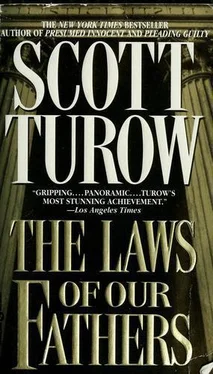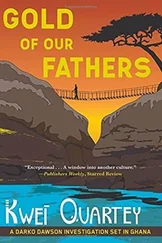Scott Turow - The Laws of our Fathers
Здесь есть возможность читать онлайн «Scott Turow - The Laws of our Fathers» весь текст электронной книги совершенно бесплатно (целиком полную версию без сокращений). В некоторых случаях можно слушать аудио, скачать через торрент в формате fb2 и присутствует краткое содержание. Жанр: Криминальный детектив, на английском языке. Описание произведения, (предисловие) а так же отзывы посетителей доступны на портале библиотеки ЛибКат.
- Название:The Laws of our Fathers
- Автор:
- Жанр:
- Год:неизвестен
- ISBN:нет данных
- Рейтинг книги:5 / 5. Голосов: 1
-
Избранное:Добавить в избранное
- Отзывы:
-
Ваша оценка:
- 100
- 1
- 2
- 3
- 4
- 5
The Laws of our Fathers: краткое содержание, описание и аннотация
Предлагаем к чтению аннотацию, описание, краткое содержание или предисловие (зависит от того, что написал сам автор книги «The Laws of our Fathers»). Если вы не нашли необходимую информацию о книге — напишите в комментариях, мы постараемся отыскать её.
The Laws of our Fathers — читать онлайн бесплатно полную книгу (весь текст) целиком
Ниже представлен текст книги, разбитый по страницам. Система сохранения места последней прочитанной страницы, позволяет с удобством читать онлайн бесплатно книгу «The Laws of our Fathers», без необходимости каждый раз заново искать на чём Вы остановились. Поставьте закладку, и сможете в любой момент перейти на страницу, на которой закончили чтение.
Интервал:
Закладка:
As its first witness, the prosecution calls Detective Lieutenant Lewis Montague of Area 7 Homicide, who supervised the case investigation. When his testimony is complete, Montague will be in and out of the courtroom to assist the prosecutors – contacting witnesses, retrieving exhibits. He's the cop on the case. Questioned by Rudy Singh, in an orderly and energetic way, Montague describes what confronted him on the morning of September 7 – uniforms, yellow tape, ambulances, and cruisers. Photos are produced. Pictures of the body are passed up to me. I thumb through them and write down the exhibit numbers. There is no face, just mess. Grim, I think. But it's not June. It occurs to me after the fourth or fifth eight-by-eleven I may be reacting to the fact she gained so much weight. In the scramble of papers already heaped here on my leather blotter, I find the path report. Seventy-seven kilograms! I am mortified for June's sake. The woman I knew had an enviable adult sensuousness, on which she clearly counted, even in the midst of the revolution.
'Did you examine the victim?' Rudy asks.
'We waited for the PP.' Police pathologist. Montague bothers himself with a glance my way and adds, confidentially, 'She was off-line, Judge. Clearly.' Dead, in other words. The cops are always at their toughest when the subject is dying. They have a thousand euphemisms. 'Giving the Q sign' is the one that occasionally makes me suppress a smirk. It means the decedent was found with her tongue hanging out of the corner of her mouth.
'And did you, Detective, have occasion to make observation of a young woman who was subsequently identified as Lovinia Campbell?'
'Ms Campbell was on the pavement at the time I arrived, about fifty feet from Mrs Eddgar. A paramedics team which was on scene was preparing to remove her.'
Montague details her position. A photo of a bloodstain is offered, then a schematic line drawing of the street. Montague makes an X and a Y to indicate the positions of Lovinia and June Eddgar. The testimony is crisp, dispassionate. Montague describes the work of other officers whom he supervised. Evidence techs went over the interior of the vehicle. They found June's purse and dusted it for prints, then inventoried the contents. A uniformed officer called in the plate on the Nova and received a report that the car was registered to Loyell Eddgar in the town of Easton. Finally, Montague says he directed a canvass of the neighborhood. After the results were reported to him, he instructed Homicide investigators to attempt to locate an individual.
'And what was the name of that individual?' asks Rudy, tiptoeing past the hearsay rule. 'Ordell Trent.'
'And was Ordell Trent identified by any other name?' 'Hardcore,' says Montague. 'That's his gangster tag.' 'And calling your attention, sir, to September u, 1995, four days later, did you have occasion to meet with Hardcore?' ‘I met him that day, at Area 7.' 'And who else if anyone was present?' 'His lawyer. Jackson Aires.'
'And did you receive anything that day from Hardcore?' Rudy has gone back to the prosecution table and fishes in the cardboard box where the state stores its exhibits. On the white carton, the prosecutors have written the case name, People v. Eddgar, and in letters big enough for a street sign – and certainly for a jury to have noticed – consp. murder. Rudy again holds up People's Group Exhibit 1, the $10,000 on which Nile's fingerprints were found. Montague says he received the money from Hardcore, initialed it, and submitted it for fingerprint examination.
'And what, if you please, was the result of that examination, Lieutenant?'
Rankled, Hobie takes his feet. 'Your Honor, I already stipulated. What's this about?'
'Yaw On-ah,' answers Rudy majestically, ‘I am merely trying to establish the process of Lieutenant Montague's investigation.' He is, in fact, attempting to emphasize his best evidence, which is why Hobie accepted the stipulation in the first place. I sustain the objection and Singh is done.
Montague turns his head minutely, awaiting Hobie. Sitting below me a few feet away, Lew Montague is a picture of repose. He wears a blue blazer and a shirt pilled at the collar. His long black hair is smoothly combed. He seems thickened by experience, by his years of scraping blood and guts off the streets near the projects. In the witness chair, he sits almost limply. Montague has been crossed and recrossed once a week for at least a decade and has fully mastered the body language of credibility. He will maintain his calm. His voice will never rise. His answers will be brief. A cop like Montague, a true expert on the stand, could convict virtually anyone he chooses, support the theory of phlogiston or the burning of witches at the stake.
'Just a few questions, Detective,' says Hobie. He is in another gorgeous suit; his beard is trimmed and his fingernails sparkle with clear polish. He starts toward Montague and then, seemingly struck by something, retreats. He takes the plastic bags containing the currency, People's Exhibit i, from Rudy's hand. The band of Hobie's watch, a huge hunk of gold, comes briefly into view from beneath his French cuffs.
'Now when you sent this money here to the state police lab, did you happen to ask them to test for anything besides fingerprints?'
Montague frowns barely. He catches Hobie's drift at once. My friend Sandy Stern has often told me that a defense lawyer is like a person feeling along a wall, looking for a light switch in the dark. Hobie, apparently, is in search of procedural defects, hoping the state performed scientific tests about which they failed to advise him. There is always the vague hope, even in the era of the Rehnquist court, that a defendant can be set free, not because he is innocent, but because the state has been unfair.
'No,' Montague answers to the question about other tests.
'So you didn't test to see if there were, perhaps, traces of blood on this money?'
'No.'
'You didn't attempt to see if there was, for instance, any evidence of gunpowder?'
'Gunpowder?' Montague contains himself. 'No.'
'Could you have run those tests?'
'I saw no reason to.'
'You could have, though?'
'Sure.'
'Could you do it now?'
'No,' says Montague. 'No, wait. Yes, you could. I was going to say no, because the money was treated with ninhydrin' – the stinky purple print-developing agent – 'but we only sent half of it. The lab -' Montague lifts a hand, but it is the soured mouth that says it all.
'The lab sometimes loses track of things?'
'Yuh,' says Montague, happy to say no more.
Hobie nods gravely, as if this were a major concession. I'm not surprised to find that Hobie is a bit of a courtroom con artist. As a young man, he was always so emphatic, even when he was out of his mind or ill informed. His initial inquiries of Montague predictably reveal a sort of high-wire style, asking another question because he asked the first one, letting his ego roam free in the thin air of the courtroom. As a trial lawyer, I always felt stifled. I was never one of these great performers. I was more Tommy's style, just somebody who got the job done, but as a result I was not inclined to the kinds of blunders that seem the inevitable consequence of Hobie's free-association manner.
'Now this fellow Ordell – Hardcore,' Hobie says, changing subjects, 'you indicated he was known to you as a gang member. Which gang was that?'
'You mean what gang he belongs to? At Tower IV at Grace Street, they tend to be Black Saints Disciples. Most are jumped-in to a set called the T-4 Rollers.'
'And is Hardcore a leader in that gang?'
'Counselor, a gang isn't organized like the police department or a corporation. You know, who's in charge can vary from day to day, depending on who they think is cool – who shot, who robbed, who busted on the Goobers. Candidly, that's not my thing. They kill each other, I learn what I have to. Otherwise, you know -' He lifts a hand with a glistening ruby ring on the smallest finger and doesn't bother with the rest. Montague is from the Joe Friday school: Just the facts. The kind of stuff Hobie is asking about is for sociologists or reporters, people who think there are motives worth understanding beyond plain meanness. Worst of all, the questions imply that Montague has an abstract interest in people whom, truth be told, he largely despises. In reaction, he casts a wayward glance at the prosecutors. Molto, in his frumpy suit, throws an elbow in Rudy's side and Rudy takes his feet, even as Tommy continues whispering what it is he ought to say.
Читать дальшеИнтервал:
Закладка:
Похожие книги на «The Laws of our Fathers»
Представляем Вашему вниманию похожие книги на «The Laws of our Fathers» списком для выбора. Мы отобрали схожую по названию и смыслу литературу в надежде предоставить читателям больше вариантов отыскать новые, интересные, ещё непрочитанные произведения.
Обсуждение, отзывы о книге «The Laws of our Fathers» и просто собственные мнения читателей. Оставьте ваши комментарии, напишите, что Вы думаете о произведении, его смысле или главных героях. Укажите что конкретно понравилось, а что нет, и почему Вы так считаете.












